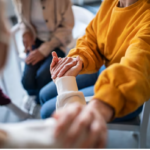Gay Pride: LGTBQ+Mental Health Awareness
It’s June, and that means it’s Gay Pride Month! For our part, we want to begin Gay Pride Month this year by talking about LGBTQ mental health and well-being, and just exactly why the LGBTQ community often face higher rates of mental health conditions.
Here at Well Being Trust, we spend a lot of time talking about, thinking about, and working to reduce the stigma that sometimes surrounds mental health conditions. The LGBTQ community really faces twin stigmas—the mental health stigmas that the broader population also contends with, and, then, the stigma that sometimes still surrounds the LGBTQ community. And while, in the past few decades, we’ve made some very encouraging strides in fighting both these stigmas, the intersection of these twin social forces can have tragic consequences for LGBTQ-identifying people living with mental health conditions.
For Gay Pride Month, let’s fight stigma with education. Below you’ll find a snapshot of LGTBQ mental health., and how discrimination, prejudice, and other biases can lead to poorer health outcomes.
The LGTBQ community experiences higher rates of mental illness than the broader population.
People who identify as LGBTQ experience higher rates of mental health conditions, including depression, anxiety, and substance misuse disorders.
- Individuals who identify as LGBTQ are nearly 3 times as likely to experience mental health conditions.
- LGBTQ youth are 2 to 3 times as likely to attempt suicide as straight youth.
- 38%-65% of transgendered people have experienced suicidal ideation.
- 20%-30% of people who identify as LGBTQ misuse substances, significantly higher than the rest of the population, at 9%.
LGBTQ people are exposed to more trauma as a result of stigma than the broader population.
One of the reasons people in the LGBTQ community experience higher rates of mental health conditions is because they are exposed to more trauma and adverse life events, due to stigma, discrimination, and other biases, which can exacerbate, or even trigger mental health conditions.
- 57% of LGBTQ-identifying Americans say they have personally been subjected to derogatory slurs regarding their sexual orientation and/or gender identity.
- More than 50% of LGBTQ-identifying Americans say they have experienced violence for being LGBTQ.
- 42% of LGBTQ youth say they live in a community that is not accepting of LGBTQ people.
- 26% of LGBTQ youth say their biggest problem is not feeling accepted by their families.
LGBTQ people face more barriers to receiving quality healthcare.
Because the LGBTQ community experiences relatively high rates of trauma due to stigma, they also frequently have more urgent mental healthcare needs. But stigma, in addition to increasing incidences of adverse life experiences, also interferes with LGBTQ-identifying people’s ability to access the care and treatment they need.
- More than 1 in five LGBTQ-identifying Americans say they have withheld information about their identity/orientation while seeking care, for fear of discrimination or disrespect.
- 30% of transgender people reported not seeking care at all for the same reasons.
- 8% of LGB-identifying Americans, and 27% of transgender Americans say they have been denied necessary treatment outright.
- In a survey of LGB-identifying Americans, more than 50% of participants reported that they had personally experienced healthcare providers denying care, using harsh language, or citing the patient’s sexual identity or gender orientation as the cause of their illness.
In a 2015 study, 80% of first-year medical students expressed an implicit bias against LGBTQ people. 50% expressed explicit bias.
We want to know what Gay Pride means to you! How will you show your support? Join the conversation on social media using the hashtags #BeWell, #BeHeard, and #BeThere.
If you or someone you know is having a difficult time and would like to talk to someone about it, there are people who want to help. For teens who want to talk to other teens, call Teen Line at 310-855-4673, or text TEEN to 839863. You can also text LA to 741741 to talk with a trained Crisis Counselor for free, 24/7. For more information check out www.crisistextline.org.






